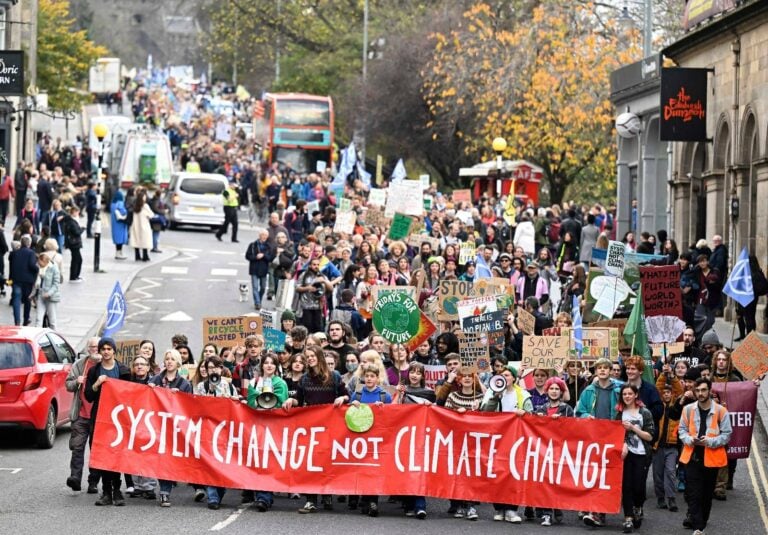
Why share buybacks are bad for the planet and people
The overlooked risks of the EU competitiveness agenda
Yesterday, Ursula von der Leyen renewed her presidency of the European Commission. One of her top priorities is making the EU more competitive. To this end, Von der Leyen launched a European Competitiveness Fund, while she and other European policymakers are also looking to raise more private capital. However, they overlook an important and worrying trend: the same EU companies they seek to support reward their shareholders more and more through share buybacks.
Issuing more shares and bonds on EU stock markets will finance European companies’ “expansion, research and development, driving economic growth and job creation”, claims the European Securities and Markets Authority (ESMA). Policy papers point to US-based companies being funded for almost 70 per cent by capital markets, while the issuing and trading of shares of European companies have dwindled to an all-time low in 2023. Policy advisors(opens in new window) stress that private capital can be tapped from the € 33 trillion savings of EU citizens to make EU companies more competitive and reduce their dependency on banks. To achieve this, the capital markets union (CMU) should be made more attractive and simpler for EU-based companies to issue shares on EU stock markets.
This argument fails to mention that companies must compete to attract or retain their shareholders by paying out ever-higher amounts in dividends and increasingly buying back their own shares. In this respect, the largest listed US companies outcompeted their EU counterparts and spent $ 5,461.4 billion in share buybacks between 2016 and 2023. In comparison, the largest listed companies in major EU countries spent $ 534.2 billion in share buybacks — with large variations per country.
In 2023 alone, the largest US-listed companies paid out $ 773.1 billion in share buybacks. In the same year, their EU counterparts spent a record-breaking $ 110.6 billion, probably as an attempt to catch up with their US competitors and attract US investors.
The many controversies of share buybacks
By repurchasing their own shares, companies intend share value to go up by reducing their number, even though other (market) events can thwart such outcomes. Obviously, such a reduction of shares on the EU stock markets is contrary to the ambitions of EU policymakers to have more shares being traded on the EU capital markets. Companies that do not announce (high) share buybacks can see their share value drop as their shareholders move to competitors that repurchase more of their own shares.
As profits have to be divided among fewer shareholders, the return on dividend per share can also increase, which would happen regardless of the share buybacks. Another reason companies prefer share buybacks is that many countries hardly tax them, if at all (no tax in countries like France, Germany, Spain, Netherlands, and the UK; 1% tax in the US).
Companies often argue that share buybacks return “excess capital(opens in new window) ” while they could also use this capital to operationalise a swift energy transition. Big Oil is an obvious example; to make their shares attractive, BP, Chevron, ExxonMobil, Shell and TotalEnergies spent $ 174.8 billion on share buybacks since the Paris Agreement (2016-2023) , in addition to $ 363.6 billion in dividends. Globally, the largest listed oil, gas and energy companies spent $ 411.4 billion on share buybacks in 2016-2023 in addition to $ 1,004.4 billion in dividends.
No wonder investors keep putting their money ($ 4.3 trillion in 2023(opens in new window) ) into oil, gas, and coal companies that mostly expand their fossil fuel production at the expense of renewable energy investments. Moreover, they vote against ambitious climate mitigation plans. For example, Vanguard voted against a climate-related resolution(opens in new window) at the 2023 annual meeting of TotalEnergies.
Share buybacks also reduce expenditure on research and development, skill development for jobs of the future, decent pay of staff and suppliers, and lowering energy and consumer prices, which would reduce inflation and increase citizens’ purchasing power.
Even more controversially, subsidies that support companies to transition out of fossil fuel energy or to be innovative to win the global digital competition might actually end up benefitting shareholders through share buybacks and dividends by those companies, except if prohibited or prevented by forgoing share buybacks as a condition for subsidies like in the CHIPS Act of US. For instance, between 2014 and 2023, the Dutch chip maker ASML received € 4.4 billion in tax rebates, which helped raise its profits to € 35.7 billion. ASML paid over 80 per cent of these profits to shareholders, the vast majority of whom were outside the EU; only 1.8% were Dutch.
Regulating share buybacks long overdue
Given that the major shareholders in EU companies are globally dominant US asset managers such as BlackRock, Vanguard, and State Street, it is not surprising that € 300 billion(opens in new window) flows out of the EU annually. Policy discussions about EU competitiveness should focus on stopping the trend of short-term-oriented shareholders endorsing share buybacks that hollow out EU companies.
The EU needs to prevent any subsidies and capital for the energy transition or innovation from ending up in the pockets of shareholders, who turn a blind eye to the multiple crises the EU and the world are facing. Here are some opportunities to address the harmful effects of share buybacks:
- The upcoming review of the Shareholder Rights Directive (2017/828 ) could be much stricter to ensure shareholder engagement and voting for the long-term benefit of the company and strengthen the public reporting obligation.
- The Corporate Sustainable Due Diligence Directive (2024) could prohibit share buybacks until the compulsory transition plans are fully financed.
- A review of the Market Abuse Regulation (2014/596) —which was due in 2019— would help clarify under what conditions share buybacks are not considered market manipulation of share value (Art. 5).
- EU company law (2017/1132) that regulates the decision-making power and conditions of share buybacks and dividends needs reconsideration, including whether to ban share buybacks, as was the case in the US until 1982.
Update: Below, you can download our August 2024 policy paper, which includes more recommendations for the EU on how to deal with share buybacks.
-
 EU policy to finance a competitive industry faces a hidden threat: Share buybacks (pdf, 223.39 KB)
EU policy to finance a competitive industry faces a hidden threat: Share buybacks (pdf, 223.39 KB)
Do you need more information?
-

Myriam Vander Stichele
Senior Researcher
Related news
-
 The trillion-dollar threat of climate change profiteersPosted in category:Long read
The trillion-dollar threat of climate change profiteersPosted in category:Long read Myriam Vander StichelePublished on:
Myriam Vander StichelePublished on: -

-




